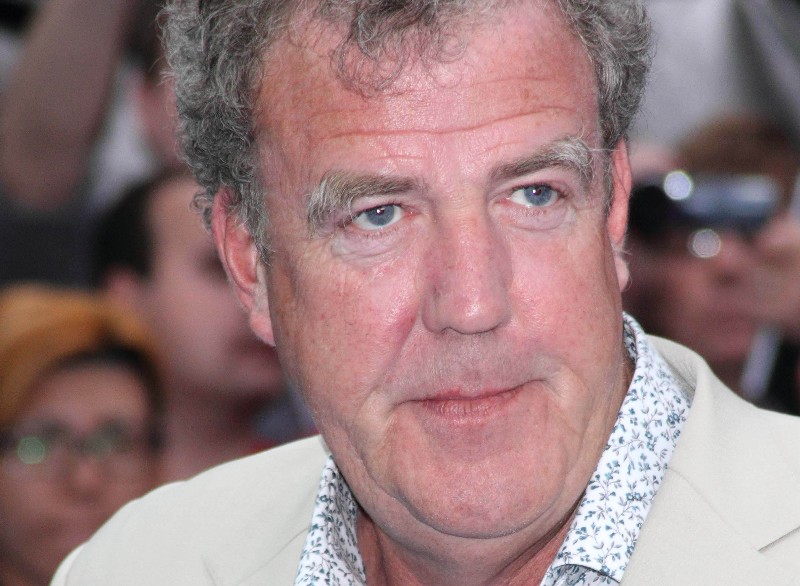JEFFREY CLARKSON’S COMEUPPANCE

Licensed to SyndicatedNews by Shutterstock_147282026
By Ruthie DiTucci
Jeffrey Clarkson is a British auto enthusiast TV show host. He is not a scientist, a doctor, a great musician nor does he provide any service the world couldn’t do without. In short, he’s a boisterous TV commentator known for his coarse juvenile statements. He is best known for the motoring programmes Top Gear and The Grand Tour.
He has humored his audiences with verbal misogynistic vulgarity for decades and the BBC has accepted his form of entertainment but even the BBC and its British competitors have had enough. About Meghan Markle, Jeffrey Clarkson said…
“At night, I’m unable to sleep as I lie there, grinding my teeth and dreaming of the day when she is made to parade naked through the streets of every town in Britain while the crowds chant, ‘Shame!’ and throw lumps of excrement at her.”
The protests to his statements came from far and wide (the loudest objection coming from Clarkson’s own daughter Emily Clarkson). It took Amazon canceling their relationship with Jeffrey Clarkson to bring Clarkson to his senses. His insults were published by The Sun, and he has since apologized to Prince Harry on Christmas Day and now to Meghan Markle herself. They do not accept the apologies.
During the sixties and seventies, crude behavior was routine and accepted in a place of business. It was not out of the ordinary for a male salesman to slap a secretary on the buttocks. Everyone, (even she) would giggle. In time, western society recognized that misogynistic behavior was no longer acceptable in business or anywhere else. Slowly but surely, societies have matured to more enlightened versions of their former selves where women are respected.
Even the United Kingdom’s Prime Minister, Rishi Sunak objected to Clarkson’s comments…
Misogyny, which refers to the hatred or dislike of women, has long been a pervasive problem in many societies around the world. However, in recent years, there has been a growing movement to challenge and reject misogyny in all its forms.
One reason for this change is increased awareness and education about the negative effects of misogyny on individuals and society as a whole. Studies and research have shown that misogyny can lead to violence against women, discrimination in the workplace, and other forms of gender-based oppression. This knowledge has helped to raise awareness about the harm caused by misogyny and has led to greater understanding of the importance of challenging it.
Another reason is the increasing number of people speaking out against misogyny and other forms of gender-based discrimination. Social media and other forms of online communication have made it easier for individuals and groups to share their experiences and raise awareness about the issue. This has led to a growing number of voices calling for change and greater accountability for those who engage in misogyny.
The women’s rights movements and feminism have been instrumental in this change, as they have brought attention to the ways in which misogyny is embedded in cultural and social systems, including in workplaces and the media. This has led to changes in laws, policies and societal norms, to better protect women and promote gender equality.
However, it’s worth noting that misogyny and other forms of gender-based discrimination are still persistent issues in many societies and it is ongoing work to eliminate these attitudes and behaviors. It’s important to acknowledge that change takes time and effort, and it’s crucial to continue speaking out against misogyny and pushing for progress.
It’s important to note that challenging misogyny is not only the responsibility of women, but of the whole society. Men, women and non-binary people all have a role in creating a culture that is inclusive, equitable and respectful of all genders.





 Afrikaans
Afrikaans Albanian
Albanian Amharic
Amharic Arabic
Arabic Armenian
Armenian Azerbaijani
Azerbaijani Basque
Basque Belarusian
Belarusian Bengali
Bengali Bosnian
Bosnian Bulgarian
Bulgarian Catalan
Catalan Cebuano
Cebuano Chinese (Simplified)
Chinese (Simplified) Chinese (Traditional)
Chinese (Traditional) Corsican
Corsican Croatian
Croatian Czech
Czech Danish
Danish Dutch
Dutch Esperanto
Esperanto Estonian
Estonian Filipino
Filipino Finnish
Finnish French
French Frisian
Frisian Galician
Galician Georgian
Georgian German
German Greek
Greek Gujarati
Gujarati Haitian Creole
Haitian Creole Hausa
Hausa Hawaiian
Hawaiian Hebrew
Hebrew Hindi
Hindi Hmong
Hmong Hungarian
Hungarian Icelandic
Icelandic Indonesian
Indonesian Irish
Irish Italian
Italian Japanese
Japanese Javanese
Javanese Kannada
Kannada Kazakh
Kazakh Khmer
Khmer Korean
Korean Kyrgyz
Kyrgyz Lao
Lao Latin
Latin Latvian
Latvian Lithuanian
Lithuanian Luxembourgish
Luxembourgish Macedonian
Macedonian Malagasy
Malagasy Malay
Malay Malayalam
Malayalam Maltese
Maltese Maori
Maori Marathi
Marathi Mongolian
Mongolian Myanmar (Burmese)
Myanmar (Burmese) Nepali
Nepali Norwegian
Norwegian Pashto
Pashto Persian
Persian Polish
Polish Portuguese
Portuguese Punjabi
Punjabi Romanian
Romanian Russian
Russian Samoan
Samoan Scottish Gaelic
Scottish Gaelic Serbian
Serbian Sesotho
Sesotho Shona
Shona Sindhi
Sindhi Sinhala
Sinhala Slovak
Slovak Slovenian
Slovenian Somali
Somali Spanish
Spanish Sundanese
Sundanese Swahili
Swahili Swedish
Swedish Tajik
Tajik Tamil
Tamil Telugu
Telugu Thai
Thai Turkish
Turkish Ukrainian
Ukrainian Urdu
Urdu Uzbek
Uzbek Vietnamese
Vietnamese Welsh
Welsh Yiddish
Yiddish Yoruba
Yoruba Zulu
Zulu